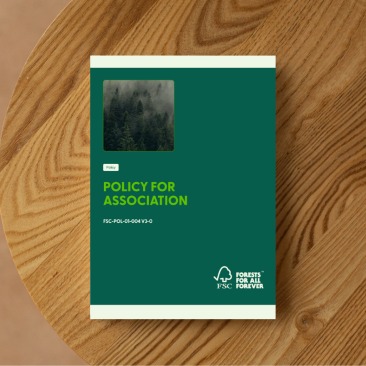
-

Objective
The objective of the Policy for Association is to outline and define unacceptable activities that severely impact forests and people on-the-ground and that pose reputational risks if associated with FSC. The policy defines consequences of engaging in them for organisations and individuals that are or seek to be associated with FSC. The policy determines which organisations and individuals can or cannot be associated with FSC.
-
 Canva
CanvaScope
The Policy for Association applies to all associated individuals, organisations, and their corporate groups and to those seeking association with FSC (this includes certificate holders and international members).
This policy applies to situations where the unacceptable activity is occurring or has occurred. Intent to engage in an unacceptable activity is not sufficient grounds to trigger an investigation or complaint. However, intent to engage in an unacceptable activity may trigger other, proactive measures by FSC, including information-gathering and monitoring, to help ensure that the unacceptable activity does not occur in the future.
-
 Canva
CanvaImplementation
The Policy for Association serves as a risk management tool for FSC, protecting the credibility and reputation of the FSC brand and organisations associated with it. It applies to entire corporate groups even if only a limited part of a group has an active relationship with FSC. All associated individuals and organisations – and their corporate group – commit to avoid taking part in any unacceptable activity, in both certified and non-certified operations, by signing a contractual agreement when entering the FSC system.
To implement the Policy for Association, two procedural documents are used:
- An individual or organisation seeking to associate with FSC must undergo a screening process and disclose information, in accordance with FSC-PRO-10-004 Disclosure Requirements for Association with FSC.
- If a potential violation of this policy is brought to the attention of FSC, then FSC-PRO-01-009 Processing FSC Policy for Association Complaints is applied.
Six unacceptable activities
FSC aims to associate with individuals and organisations aligned with the FSC mission and values and will not allow an association if the individual, organisation or its corporate group is or has been engaged in the following unacceptable activities:
01. Illegal harvesting or illegal trade in forest products:
02. Violation of customary or human rights within the forest sector:
03. Violation of workers’ rights and principles defined by ILO:
04. Destruction of High Conservation Values (HCVs) or areas:
05. Conversion of natural forest cover:
06. Use of genetically modified organisms in forestry operations:
Key concepts and FAQ
Association: An association with FSC is formally established through any of the following contractual relationships: FSC membership agreement; FSC certificate holder license agreement; FSC certification body license agreement; FSC partnership agreement.
Affiliated group: The totality of legal entities to which an associated organization is affiliated in a corporate relationship in which either party controls the performance of the other (e.g. parent or sister company, subsidiary, holding company, joint venture) as described in Policy for Association FSC-POL-01-004.
Disassociation: The termination of all existing contractual relationships (member and license) between FSC and the associated organization (and its affiliated group). Disassociation also prevents entry into any new contractual relationships with FSC.
Ending disassociation: A disassociated organization may request to start a process to end disassociation by expressing interest to FSC. As part of that process, an organization-specific roadmap must be developed. A roadmap is a framework and plan of how to remedy, correct and prevent reoccurrence of previously identified violations of the FSC Policy for Association. It also includes other trust-building measures. Disassociation can be lifted only upon completion of the agreed conditions specified in the roadmap.
-
Why are these activities unacceptable for FSC?
Our mission is to protect forests for future generations. And our membership is made up of companies striving for environmentally and socially responsible practises – of environmental defenders, trade unions, human rights campaigners and those fighting for indigenous peoples.
The activities we prohibit are totally opposed to the mission of our organisation and the members who make it. There is no place for this behaviour in FSC, whether activities happen in the forests of a certified forestry company or the non-certified forests of one of their affiliates.
-
Who can raise concerns about destructive activities?
There are no requirements as to who can submit a complaint or raise concerns in the FSC system.
While anybody may share concerns, the information submitted must include necessary and relevant information and evidence for FSC to take the appropriate action. This required information is noted on the submission forms and processes, and defendants are encouraged to provide as much detailed information as possible so that FSC can make an informed decision as to whether the complaint will be accepted.
If you are concerned about the activities of an organisation connected to FSC, we want to hear from you. You can submit your complaint (including all the evidence) using the button below.
-
Who investigates when credible allegations are raised?
FSC assigns an investigation team comprising of experts from the field of allegations. In building an investigation team, each team member is selected and then approved by those raising concerns and the defendant organization to ensure impartiality.
While not a requirement, the investigation team will typically include experts from the country where wrongdoing is alleged. The investigation team is then not only uniquely qualified through their professional expertise, but also has a greater understanding of the national context.
-
Who decides whether an organization should be excluded from the FSC scheme?
The investigation team delivers their report to FSC, complete with the evidence and level to which each allegation was verified. This report is presented to the FSC Policy for Association Decision Panel who will assess the conclusions of the investigation. The Panel may decide to recommend that FSC Board of Directors make the decision on excluding organization from the FSC scheme.
-
What are the consequences of exclusion from the FSC scheme?
Upon being excluded from the FSC scheme the organization’s trademark license agreements are immediately terminated, all certificates are withdrawn and they are blocked from further certification and association such as membership.
This exclusion extends beyond the organization found to engage in unacceptable activities, applying to any parent, subsidiary or sister company connected by more than 51% ownership. All companies are blocked from any FSC certification until a complete remedy and reform process has been fulfilled and all requirements met.
-
Can excluded organizations re-enter the FSC scheme?
Excluded organizations can re-enter the FSC scheme after exhibiting the fulfilment of conditions addressing remedy caused by past harm and reformation. Only after concrete proof that these requirements have been fulfilled can the organizations potentially re-enter the FSC scheme.
Documents
This policy version 2-0 is the currently effective version of the Policy for Association. The policy version 3-0 will be applicable from from the 1st of January 2023. The previous version 2-0 of the policy remains effective for violations that occurred before the effective date of the version 3-0.
